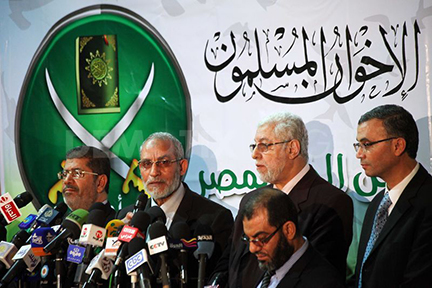
The debate over whether or not to send a cruise missile or two into Syria and spank Bashar al-Assad for adding chemical weapons to his bloody arsenal of putting down the revolt in Syria has overshadowed the continuing battle in Egypt for control of the political future. In both situations there is an alarming paradox for most Western observers: there seem to be no good guys wearing white hats, like in an early John Wayne movie. The al-Assad clan has run a security-based dictatorship that, like Saddam Hussein, tortured and killed opponents. But the major opposition, at least at this point in the ongoing civil war, includes a number of extremists who would be as bad a choice to take over. As the American experience in both Iraq and Afghanistan well demonstrates, the friendly (to us) leaders we would like to install (and did with impunity in the old days) do not work out so well these days.
Egypt may not be today’s top story coming out of the Middle East, but it is hardly a stable situation. An article just out in the New Yorker by Joshua Hersh illustrates the clear objective of the Muslim Brotherhood to de-secularize Egypt. Those who came to power around Morsy were not very brotherly brothers and created a backlash by attempting to muscle out those who were not of their ideology. One of the people interviewed for the article was Iman Ezzeldin, director of Egypt’t National Library, where thousands of manuscripts are preserved. She was unceremoniously fired by the Morsi regime, which attempted to put Brotherhood members in key cultural posts. Here is what Hersch provides:
“The Brotherhood has a grudge against culture,†said Ezzeldin, who in addition to her role at the Library is also a professor of drama at Ain Shams University. She wore a green blouse and pearl earrings that dangled from her ears like elongated teardrops. A secular Muslim, she proclaims her right to keep her hair uncovered if she wants, and have a drink every now and then should she choose to; she saw the Brotherhood as a threat to her very way of life. “The whole country was suffocating under them.â€
“Some people said the Brotherhood was going to protect the archives, but ‘protection’ is not in the vocabulary of the Muslim Brotherhood,†Ezzeldin said. In fact, as she saw it—in a view shared by many of her peers—the Brotherhood wanted to control the Library and Archives in order to gain access to sensitive national-security documents, and to censor or alter records and artifacts. “In the Archives, you have some very important material, if you believe the rumors, and I do,†she said. “There’s information about land ownership disputed by Turkey, and the border with Sudan, and other things. They also wanted all of the archives about the Brotherhood itself.â€
Ezzeldin wanted to show me some of the rare manuscripts that she had worried the Brotherhood might have sought to destroy. “Most of our manuscripts are Persian, and many have depictions of the Prophet or of women or of histories from before Islam,†she said. We passed through a set of sliding glass doors and entered a cool room where the rare manuscripts were on display in specially designed cases, with carefully controlled lighting and levels of humidity—the result of a 2007 renovation and funds from a United Nations national-heritage project.
“This is one of the ones I was most worried about,†she said, as we approached a colorful Persian astrology book. It was open to a page depicting the Zodiac goddess Virgo, dressed in a bright, purple flowing robe. “They don’t believe in this, so who knows what they would do.†We moved on to some hand-drawn history books with knights riding on gold-painted horses, and a book of early fables that had been translated from Sanskrit. One told the story of a group of white rabbits who teamed up to “seek revenge on a herd of elephants who had thoughtlessly trampled upon them.†In another room, there was a giant, Mamluk-era edition of the Koran, from the fourteenth century. “I wasn’t really worried about this one,†Ezzeldin said with a wink. Then she added, “Although, I didn’t want them to give it away to their friends in Qatar.â€
The Brotherhood had an agenda that many Egyptians felt was using “democracy” as a ploy to gain power and press their ideological agenda. This is not to justify the military takeover, which has been unnecessarily brutal. But, coup or non-coup, Morsi is gone and Egypt’s brief flirtation with the Muslim Brotherhood is over. In a sense the international success of the Muslim Brotherhood created a problem on the home front. They were no longer seen as home-grown Egyptian but part of a broader, even pan-Islamic, wave that could not possibly represent the diverse views of Islam in the region. Many Egyptians, even those sympathetic to the moral qualities espoused by the Brotherhood, saw that Morsi was as bad as Mubarak. For some there was no more “democracy” than there had been in the days of Ramses II or Thutmose IV.
In both Egypt and Syria the last laugh is Machiavelli’s. The tendency to use a power base to coerce others into a narrow ideological frame and to crack down on legitimate opposition was around a long time before Mubarak, Morsi, Saddam Hussein and Bashar al-Assad. It is impossible for anyone to be brotherly when intolerance, even if softened by a grudging semi-tolerance, is built into an agenda. Military takeovers, like retaliating bomb for bomb, trample ethics for the sake of expediency. Who has the right kind of peace-making bleach to whiten the black hats in this current political nightmare? If anyone has an answer to that, I will take off my hat to you.